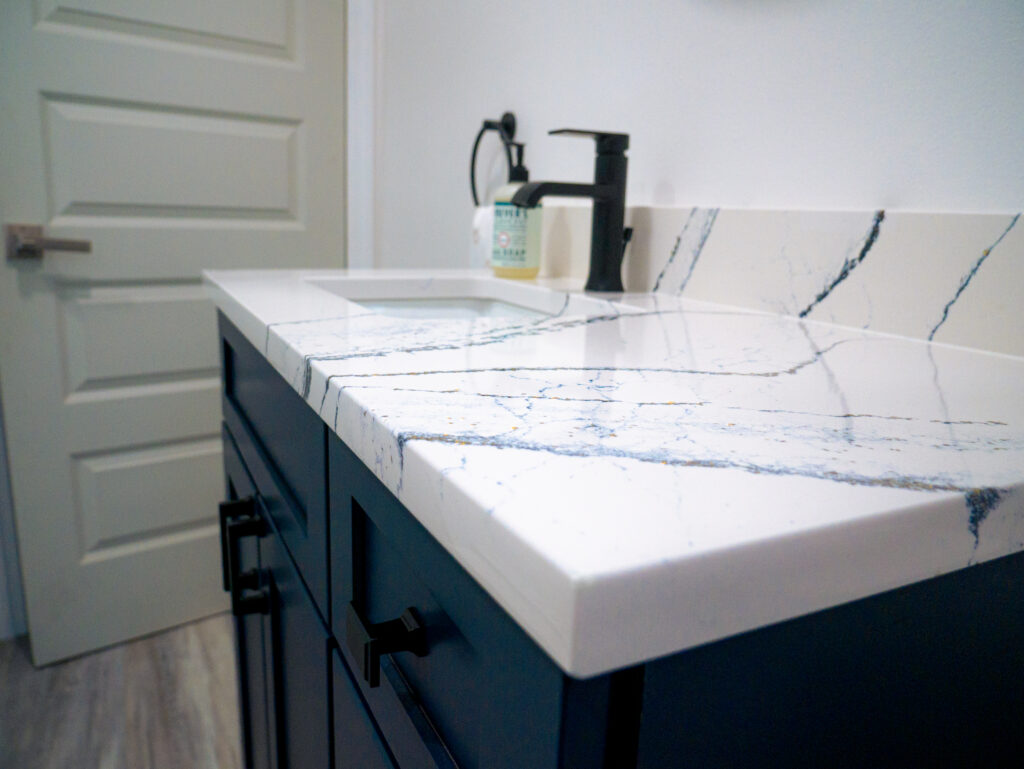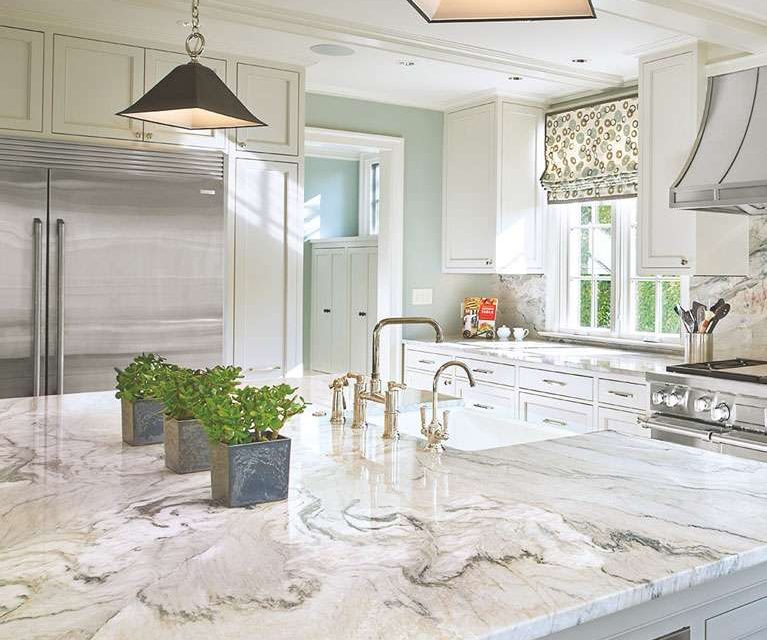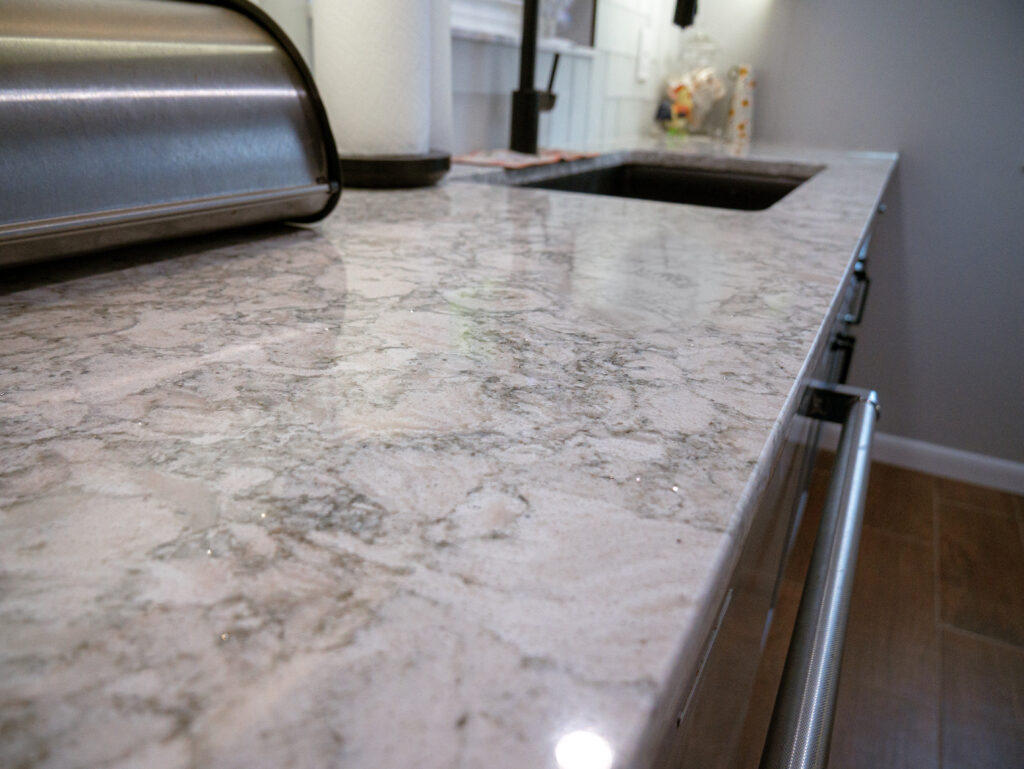Which countertop material is best for your home?

Quartz and quartzite, two countertop materials that couldn’t be more different from each other, so of course they share almost the same name. Because that makes sense, right? What gives? Well there is actually a good reason for the two sounding eerily similar (like half a word similar).
In this blog, we will be breaking down what the countertops are, how they are made and the pros and cons of each of the countertop materials. By the end of this article, we hope our readers will find the information necessary to determine which countertop option is best for their next remodel.
What is Quartzite?
For the everyday person, quartzite is definitely the lesser known of the two countertops. Before I started working here I’d never heard of it, so myself included. So that is where we’ll start.
Quartzite is a natural stone that is mined from the earth. It’s a metamorphic rock, which starts out as sandstone, and with high pressure and high heat, it’s transformed into a much harder, durable material. Some would say, quartzite is the diamonds of countertops. The quartz crystals that make up sandstone fuse together and interlock, resulting in one of the toughest surface materials on the market. Stronger than granite even.
If you’re looking for a surface that is reasonably priced and birthed by the earth itself, then quartzite is the way to go. But what are the pros and cons?


Pros
Some of the favorable characteristics of quartz are:
- Natural Beauty:
- Quartzite features unique and stunning natural patterns and colors, often resembling marble, giving each slab a distinctive appearance.
- Durability:
- Quartzite is one of the hardest natural stones, making it highly resistant to scratches, etching, and wear. It ranks higher than granite on the Mohs hardness scale.
- Heat Resistance:
- It can withstand high temperatures, making it an excellent choice for kitchen countertops where hot pots and pans are used.
- UV Resistance:
- Quartzite is resistant to UV radiation, which means it won’t fade or change color when exposed to sunlight. This makes it suitable for both indoor and outdoor applications.
- Low Maintenance:
- With proper sealing, quartzite countertops are relatively low maintenance. They DO require periodic sealing to maintain their stain resistance, but day-to-day cleaning is easy with mild soap and water.
Cons
With pros there are cons. Nothing is perfect. If you’re religious, “there can be no heaven without hell.” If you’re agnostic, Newton’s Third law of motion says “for every action there is an equal and opposite reaction.” So here are the cons to quartzite as a surface material:
- Cost:
- Quartzite is often more expensive than other countertop materials like granite or engineered quartz. The cost can be high due to its natural beauty and the labor-intensive process of quarrying and finishing the stone.
- Porosity:
- Being a natural stone, quartzite is porous and requires regular sealing to prevent stains and etching from acidic substances. If not properly sealed, it can absorb liquids and become stained.
- Complex Installation:
- Due to its hardness, brittleness and weight, quartzite can be challenging to cut and shape. This makes installation more complex and expensive, often requiring professional expertise.
- Maintenance:
- Although it is relatively low maintenance once sealed, quartzite still requires periodic resealing to maintain its resistance to stains and damage. This ongoing maintenance can be a drawback for some homeowners.
- Inconsistency:
- Being a natural stone, each slab of quartzite can vary significantly in color and pattern. This natural variation can be a drawback if you prefer a more uniform look.
What Is Quartz?
Quartzite may be a natural mineral, but quartz countertops are engineered surfaces that are composed of 90-97% crushed quartz crystals, combined with coloring pigment and bound by polymer resin. In contrast to quartzite natural beauty, engineered quartz are more consistent, this allows slab designs that are inspired by the understated or dramatic veining of marble, the industrial feel and look of concrete, and its own unique patterns, making it such a contender to quartzite. Quartz consistency also allows more freedom in the customization of homeowners kitchens and bathrooms.


Pros
Being a man-made surface material, quartz has many favorable traits:
- Wide Range of Colors : Quartz comes in a wider range of colors and textures compared to granite. This makes mixing and matching much easier since it is relatively available in smoother and plain surface.
- Hygienic : Quartz is nonporous which makes it an extremely hygienic surface material. Resisting mold, mildew and bacteria it makes it less likely to hold viruses. Being nonporous it also needs no resealing, unlike granite.
- More Durable : Being an engineered surface quartz is harder and more durable than any natural stone. Also more water resistant when in wet locations such as; Bars, bathrooms and showers.
- Low Maintenance:
- Quartz countertops require minimal maintenance compared to natural stone. They do not need to be sealed and are resistant to staining, reducing the need for regular upkeep.
- Longevity:
- With proper care, quartz countertops can last for decades, maintaining their beauty and functionality over time, which can add value to your home.
Cons
Quartz is not without it’s only flaws however. The cons to quartz are:
- Nonnatural : Being an engineered surface material, quartz has no true natural beauty to its aesthetic such as the swirls and striations that come with granite. This makes every similar colored slab look the same with no real uniqueness.
- Non Heat Resistance : Unlike granite, Quartz can and will be damaged under excessive heat. It is important to place heating pads under hot pots and pans.
- Inside only : Quartz may be more water proof but in harsh weather conditions extreme fading will incur. This makes Quartz unsuitable for outside bars, tables or counters.
- Seam Visibility: In larger installations or areas with complex layouts, seams may be visible where multiple slabs are joined together. While skilled fabricators can minimize seam visibility, it can still be a consideration for some homeowners.
- Susceptibility to Scratching: While quartz is highly durable, it is not entirely scratch-proof. Abrasive materials or sharp objects can cause scratches on the surface, particularly in darker-colored quartz.
You can read more about Quartz, and all their different styles on our blog here: https://g2homeservices.com/blog/quartz-manufactures-whatsthe-best-option-for-your-budget/
In Conclusion
Both quartz and quartzite have their unique advantages and can be excellent choices for countertops depending on your needs and preferences. Quartz offers consistency, ease of maintenance, and a wide range of design options. Quartzite provides natural beauty, exceptional durability, and a unique look that can’t be replicated. Understanding these differences will help you choose the right material that aligns with your aesthetic goals and lifestyle.
Whether you prefer the engineered perfection of quartz or the natural allure of quartzite, investing in either will add lasting value and beauty to your home. Annnnd remember, always consult with a designer before making any final decisions.
Need new countertops for you kitchen or bathroom? Maybe an outdoor area? Reach out the professionals at G2 Home Services today! Our expert team of experienced Designers here at G2 are more than capable of helping you make the right decision for your home.
Contact G2 Today!
G2 Home Services protects at risk homeowners from inexperienced and sometimes unlicensed contractors that use low prices to take advantage of embarrassed, frustrated or overwhelmed clients.

